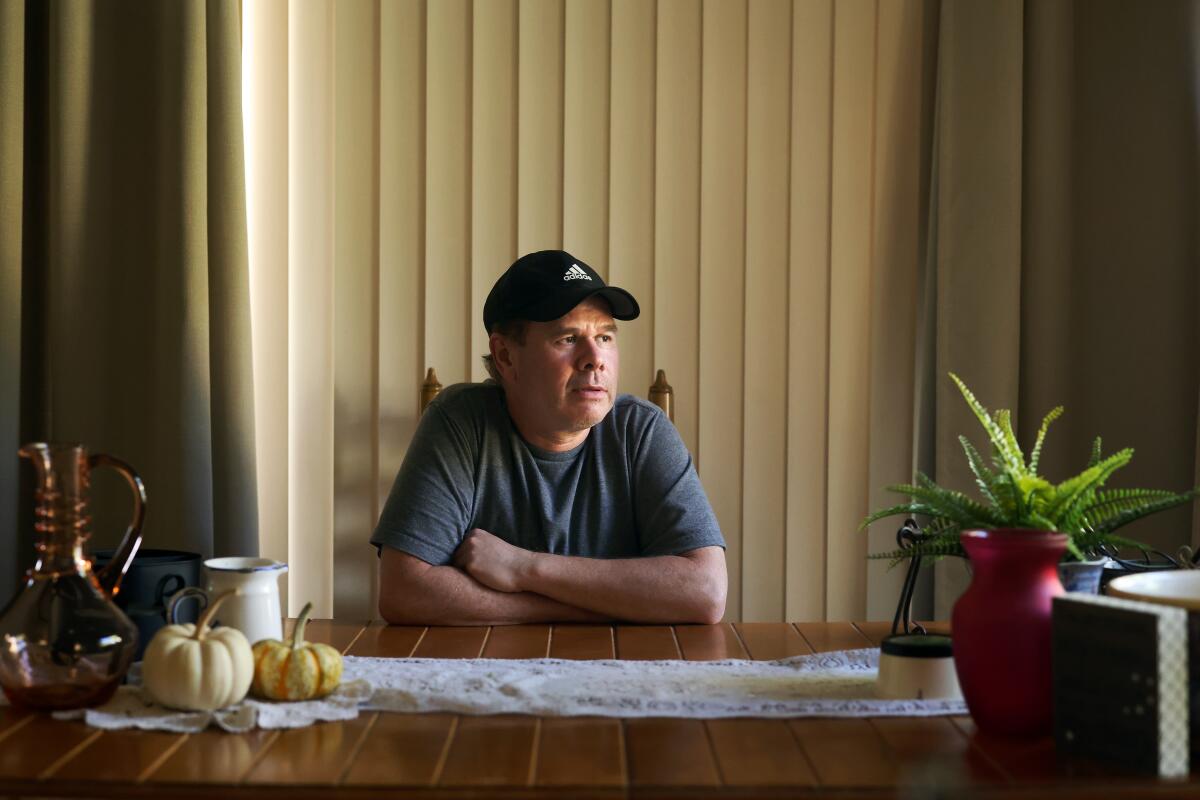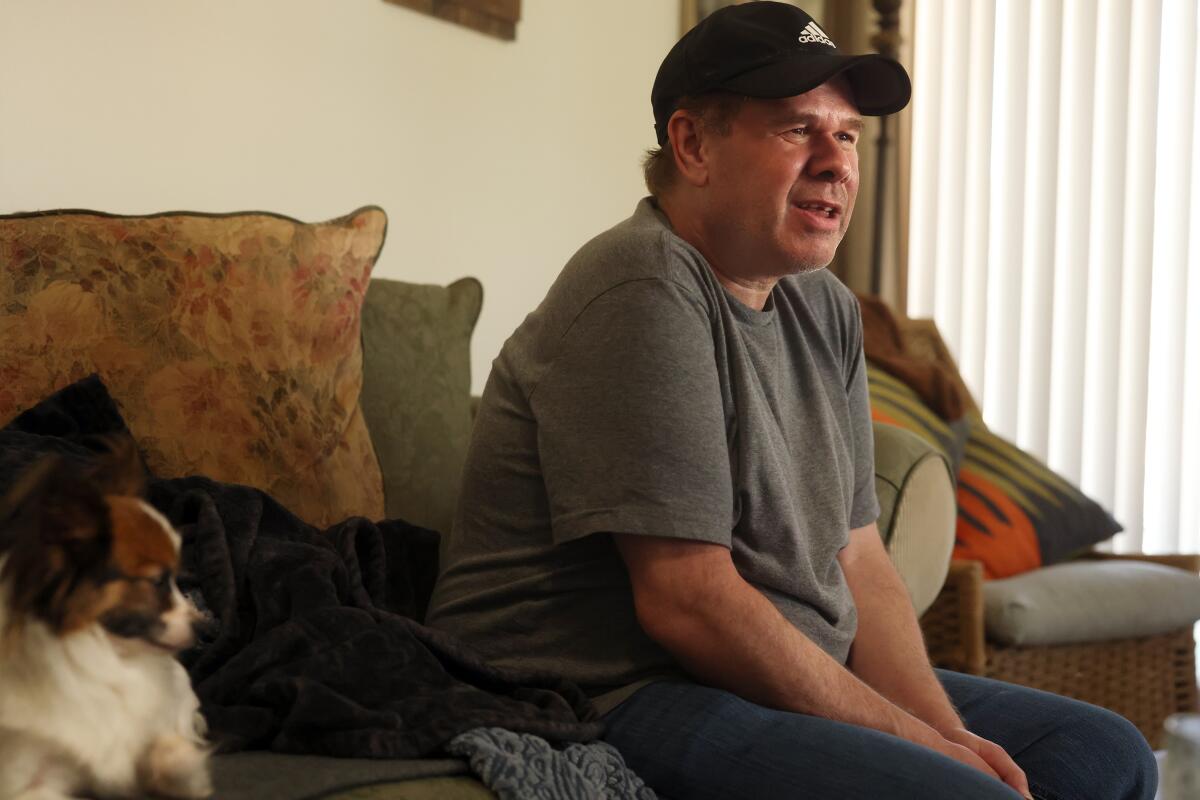‘You can’t get out’: Mentally ill languish in California jails without trial or treatment

- Share via
John Haasjes was having a bad Christmas.
It was 2020, and he thought his downstairs neighbor was spying on him. They exchanged words, and she called the cops. He was arrested on suspicion of making a verbal threat and booked into a Kern County jail.
Haasjes has a developmental delay and schizoaffective disorder. The 58-year-old Tehachapi man has been in and out of mental health facilities most of his life. But he had never been convicted of a crime, and he said he didn’t really understand the felony charge against him.
Authorities soon acknowledged the same. In March 2021, Haasjes was declared “incompetent to stand trial.”
The legal designation meant Haasjes could not understand the court process for determining his guilt or innocence. It meant he was entitled to mental health treatment before he could stand trial. It also should have meant his prompt transfer to a state hospital or treatment program to receive care — but it did not.
Like thousands of other mentally ill detainees incarcerated across California in recent years, Haasjes instead languished in jail, where he was denied trial or proper treatment from the Department of State Hospitals for more than a year. He was only transferred to a hospital in February, after his cousin, a retired social worker, testified about his lack of care before state lawmakers, and his case was suddenly fast-tracked.
Others have fared much worse.
According to a decade of legal filings reviewed by The Times and interviews with mental health advocates, public defenders, family members of the mentally ill and former detainees, Haasjes’ experience fits within a much larger pattern of neglect involving some of the most vulnerable people in state custody.
At the heart of the problem is a persistent failure by state officials to sufficiently expand state hospitals or other community-based care options despite surging numbers of incompetent criminal detainees and a string of court orders mandating the state transfer such defendants out of jails faster.
Without the needed beds, mentally ill defendants are being left behind bars and without substantive care for far longer than the courts have said is constitutional. While their criminal cases and rights to a speedy trial are put on hold based on their illnesses, they are denied the services that might restore them to competency and allow their cases to proceed.
In other words, they and their advocates say, they are trapped in the criminal justice system with no access to justice.
“You can’t get out,” said Haasjes. “They just declare you incompetent. There’s no bail. There’s nothing.”
A persistent problem
The state has been getting sued for failing to properly treat mentally incompetent detainees for more than a decade, both within local jurisdictions and as part of a statewide lawsuit brought in 2015 by the American Civil Liberties Union and the families of several incompetent detainees.
In the ACLU case, known as Stiavetti vs. Clendenin, the families have lambasted state officials for allowing the mistreatment to persist for years despite claiming mental health as a legislative and budgetary priority. They have accused the state and some of its local counterparts not only of violating detainees’ constitutional rights, but exacerbating their mental health issues by denying them care.
State judges have largely agreed.
In March 2019, Alameda County Superior Court Judge Winifred Smith gave the state a year to reduce the statewide average wait time in jail for incompetent felony detainees to 60 days. She gave the state three years to bring the wait time down to 28 days and set several benchmarks in between.
The state appealed Smith’s order, but a state appellate court upheld it last year. The California Supreme Court declined to review that decision — leaving the order intact.
The state kept fighting, however. In November, lawyers for the Department of State Hospitals asked for a “pause” on the order’s requirements given the COVID-19 pandemic, which they said had forced the state to reduce admissions into its hospitals even as referrals of incompetent detainees were increasing “dramatically.”
In December, Alameda County Superior Court Judge Evelio Grillo granted the state an extension, requiring the average wait time to be reduced instead to 60 days by last month, 45 days by February, 33 days by August and 28 days by February 2024.
State officials did not meet last month’s deadline, and they have told the court it will be “impossible” to meet the other intermediary deadlines because the pandemic is “catastrophically frustrating its ability to provide services to its patient population.”
In a motion opposed by the ACLU, the state asked the court in June to do away with all but the final, 28-day deadline in 2024.
As the state has fought the order, conditions have only gotten worse.
According to the Department of State Hospitals, the state had 1,768 incompetent detainees in jail and awaiting transfer to a state hospital or other care facility as of June, which was a substantial increase from the 1,443 it had in July 2021. The average wait time for those detainees stood at 141 days, up from an average of 63 in September 2019.
The state has said it is trying to reduce the wait times, but needs more time — in part so newly allocated funding can be put to use. Officials say they have been increasing the number of beds for incompetent detainees, especially in jails, in what are called “jail-based competency treatment” programs. But they acknowledge there still are not enough for the influx of detainees.
Attorneys for the ACLU and other advocates say the state’s arguments ring hollow — or worse, raise additional concerns.
They point to the state’s history of violating court orders mandating better care for the mentally ill. They note the problem of unconstitutional wait times predated the pandemic. They say the state’s suggestion that it will somehow meet the 28-day requirement in 2024 without hitting the intermediate benchmarks is nonsensical. And they have criticized the state’s “jail-based” competency programs as a poor alternative to hospitals or community placements.
With so much in dispute, Judge Grillo issued a new order on Aug. 30 that reopened discovery — or evidence gathering — around the impact of COVID-19 or other fresh issues on the state’s ability to comply with the existing deadlines. And he set a date in March for hearing the state’s request to do away with most of them.
Serious ramifications
Stephanie Stiavetti, the lead plaintiff in the ACLU case, decided to sue the state after learning that her mentally ill brother — identified only as “N” in court filings to protect his identity — had suffered abuse in a Contra Costa County jail while awaiting an overdue transfer to a state mental health facility.
“N,” who had been arrested on suspicion of resisting sheriff’s deputies, remained in jail for a month after he was ordered committed to a state hospital, according to court records. There, he became “confused, depressed and agitated,” got into fights with correctional staff and other inmates, and ended up segregated and deteriorating further in a solitary cell that he was only allowed out of “once every several days,” the records say.
In an interview with The Times, Stiavetti said what her brother went through amounted to torture and deeply riled her as a protective older sister who happens to work in the mental health field. She said the state’s continued resistance to making improvements eight years later also angered her.
“While they make excuses, people are getting hurt,” she said.
The toll incarceration takes on mentally ill detainees, who cannot always effectively advocate for themselves or articulate their own concerns, is devastating, said former detainees, their families and other mental health experts and advocates in interviews with The Times.
Kim Pederson, a senior attorney with Disability Rights California, said leaving mentally ill people behind bars without treatment does not simply delay their care, but will “exacerbate any preexisting mental health condition” they have.
Many incompetent detainees struggle with being confined to small or shared spaces, such as jail cells, Pederson said. Many struggle to follow the strict rules that define life in jail. They end up facing additional punishments — including solitary confinement, which can be traumatizing for any inmate but especially those with mental illness. Mentally ill detainees are also more prone to abuse from other inmates.
Demetria Simpson’s son Kevron Harris, who she said has multiple diagnoses of mental illness and was declared incompetent to stand trial, spent nearly a year in jail before finally being transferred to a jail-based treatment program last month.
He was far worse off for having languished in jail so long, his mother said.
Harris, 26, was arrested on two misdemeanor charges in Fresno last September. Within weeks of being jailed, he was charged with felony battery of a custodial officer. His mother said she believes the incident was the result of Harris suffering a mental crisis in a setting where no one — including the correctional officers — knew how to respond.
Simpson said her son was placed in solitary confinement afterward. They didn’t speak for 30 days. When she saw him next in court via a video stream, she said, he had injuries to his head — including big knots and bruising — which have never been explained to her.
According to court records, Harris had his first competency hearing in October, was declared incompetent by the court in March, and was ordered to take antipsychotic medication and be committed to a state hospital in April.
In May, Harris was still in jail. He called his mother to say he couldn’t handle it anymore and would prefer to die, she said.
“I was telling him not to give up,” she said.
Simpson said she was grateful when she learned her son had finally been transferred into a jail-based treatment program last month, but she remains concerned about his future.
The last time Harris was arrested, jailed and then released without receiving the mental health treatment he needed, she said, he quickly landed back in jail.
“It’s like a revolving door,” she said.
Compliance issues
This is not the first time the state has been in violation of a court order mandating better treatment of mentally ill defendants in jail.
Stephanie Regular is an assistant public defender in Contra Costa County who helped connect Stiavetti to the ACLU after representing her brother. She has been fighting the Department of State Hospitals over the issue for a decade, and she helped win a court order in 2014 requiring incompetent detainees there be transferred into care settings within 60 days.
Since then, however, the state has routinely violated that order, which is “crushing” for her clients, Regular said. “I see them as they’re waiting for treatment in the jail just getting sicker and sicker.”
Los Angeles County — home to the nation’s largest county jail system — has been criticized by the U.S. Department of Justice for providing inadequate and dangerous care for mentally ill detainees in its jails since at least 1997. In 2015, the county and the Justice Department entered into a settlement agreement mandating sweeping reforms.
However, the county has not complied with that agreement, and thousands still aren’t getting the care they should in a system where about 40% of inmates have been diagnosed with mental illness. In separate litigation last week, the ACLU alleged “barbaric” and unconstitutional conditions for defendants at an inmate reception center in downtown L.A.
Hundreds of incompetent detainees are awaiting transfer out of jails in L.A. County, which state officials have said accounts for 30% of all incompetence referrals to the state hospital system.
The order in the ACLU case mandating faster transfer times statewide was issued and upheld by the courts with some of those past failings in mind. State officials have acknowledged past failures but said they are taking the issue seriously now and working hard to improve the system overall, with the help of the counties.
In a statement to The Times, the Department of State Hospitals said it has already added hundreds of new beds for incompetent detainees, including through diversion programs in 21 counties, a community-based treatment program in L.A. County and jail-based treatment programs across the state.
It said it launched a new “reevaluation program” to reassess detained individuals who might have been restored to competency while in jail, in order to remove them from the waiting list if so. Advocates allege the process is already being misused to artificially reduce the waiting list by removing people who still need care.
The state also pointed to $535 million in the latest fiscal year budget — and more in coming years — to improve jail-based services and expand community-based restoration and diversion programs by some 5,000 beds over the next four years.
The Department of State Hospitals said it will continue working to meet the 2024 deadline for 28-day wait times statewide. The offices of Gov. Gavin Newsom and California Atty. Gen. Rob Bonta referred all questions to the Department of State Hospitals.
Stiavetti said her family is “heartbroken and incredibly angry” about the state’s efforts to wriggle free from the existing deadlines, and “won’t stop fighting” until the state proves it is taking “the care of every mental health patient in jail seriously.”
Getting John out
By the time Sandra Siedenburg sat down before a state Senate subcommittee in February to testify about Haasjes, her cousin, it had been more than 400 days since Haasjes’ arrest, and nearly 340 since he was declared incompetent. Still, he was locked up in a pretrial jail facility in Bakersfield.

In part because of COVID-19 protocols, Siedenburg said, Haasjes was locked in his cell for more than 23 hours a day. Every day during his free hour, she said, he would shower and then call her to ask the same question: “When am I going to get out?”
Siedenburg said Haasjes has lost his subsidized housing. His mother, who was “his rock,” died while he was in jail. And he suffered abuse at the hands of other inmates, though a few took him under their wing.
Rather than the robust mental health care Haasjes was entitled to by law, he was only seen by a “telepsychiatrist once every three months for 15 minutes,” and had “a very occasional cursory social worker visit his cell door,” Siedenburg said.
Siedenberg told the lawmakers that her cousin’s treatment wasn’t right, that Haasjes deserved to come home with her.
The same day, Stephanie Clendenin, director of the Department of State Hospitals, emailed Siedenburg directly, saying she was looking into Haasjes’ case. Soon after, Haasjes was transferred into a state hospital. Officials blamed the delay on his paperwork not being filed correctly in Kern County.
He spent three months there before Siedenburg helped work out a deal with prosecutors in which Haasjes was released after pleading guilty to misdemeanor charges.
Today, Haasjes said he’s doing much better living with Siedenburg. He doesn’t have a perfect memory of his time in jail, but he remembers he was denied medical care even when he filled out special slips of paper asking for it.
“I was in the jail too long,” he said in a recent interview. “They should not put people in jail.”
More to Read
Sign up for Essential California
The most important California stories and recommendations in your inbox every morning.
You may occasionally receive promotional content from the Los Angeles Times.











